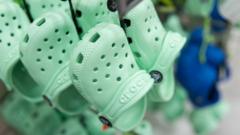Shares of Crocs, the renowned American footwear brand, have dropped by nearly 30% following a cautionary sales warning amid declining US consumer spending. The company foresees a 10% revenue decrease for the quarter ending August compared to the previous year, a factor its CEO, Andrew Rees, attributes to changing consumer behavior marked by increased caution in discretionary spending.
Crocs Faces Significant Share Price Drop as US Consumer Spending Declines

Crocs Faces Significant Share Price Drop as US Consumer Spending Declines
As Crocs experiences a substantial fall in sales projections, the company warns of a declining consumer interest impacting its share price.
The footwear manufacturer's stock has now reached its lowest point in almost three years, incurring the worst single-day decline in 15 years after the troubling forecast. Crocs is particularly concerned about the prospect of a difficult second half of the fiscal year, influenced by inflationary pressures and potential repercussions from US trade policies. Chief Financial Officer Susan Healy has indicated that the company anticipates a $40 million loss for 2025 due to tariffs imposed on imports.
Rees expressed optimism about mitigating tariff impacts through supply chain efficiencies, but noted significant evidence that many customers are now hesitant to spend, with a noticeable drop in retail foot traffic. In light of this, Crocs plans to further minimize product discounting, fearing this strategy may negatively influence sales.
As attention turns to major sporting events such as the 2026 World Cup and the 2028 Los Angeles Olympics, Rees observes a trend where consumers are gravitating back toward athletic footwear. This comes despite a 3% rise in second-quarter revenue to $1.1 billion compared to last year. Crocs' acquisition of the casual shoe brand HEYDUDE for $2.5 billion in late 2021 further diversifies its product offering, but current market conditions remain challenging.
Consumer behavior is rapidly evolving, particularly in the fashion industry, creating obstacles for brands like Crocs as they navigate these turbulent economic waters.
Rees expressed optimism about mitigating tariff impacts through supply chain efficiencies, but noted significant evidence that many customers are now hesitant to spend, with a noticeable drop in retail foot traffic. In light of this, Crocs plans to further minimize product discounting, fearing this strategy may negatively influence sales.
As attention turns to major sporting events such as the 2026 World Cup and the 2028 Los Angeles Olympics, Rees observes a trend where consumers are gravitating back toward athletic footwear. This comes despite a 3% rise in second-quarter revenue to $1.1 billion compared to last year. Crocs' acquisition of the casual shoe brand HEYDUDE for $2.5 billion in late 2021 further diversifies its product offering, but current market conditions remain challenging.
Consumer behavior is rapidly evolving, particularly in the fashion industry, creating obstacles for brands like Crocs as they navigate these turbulent economic waters.



















